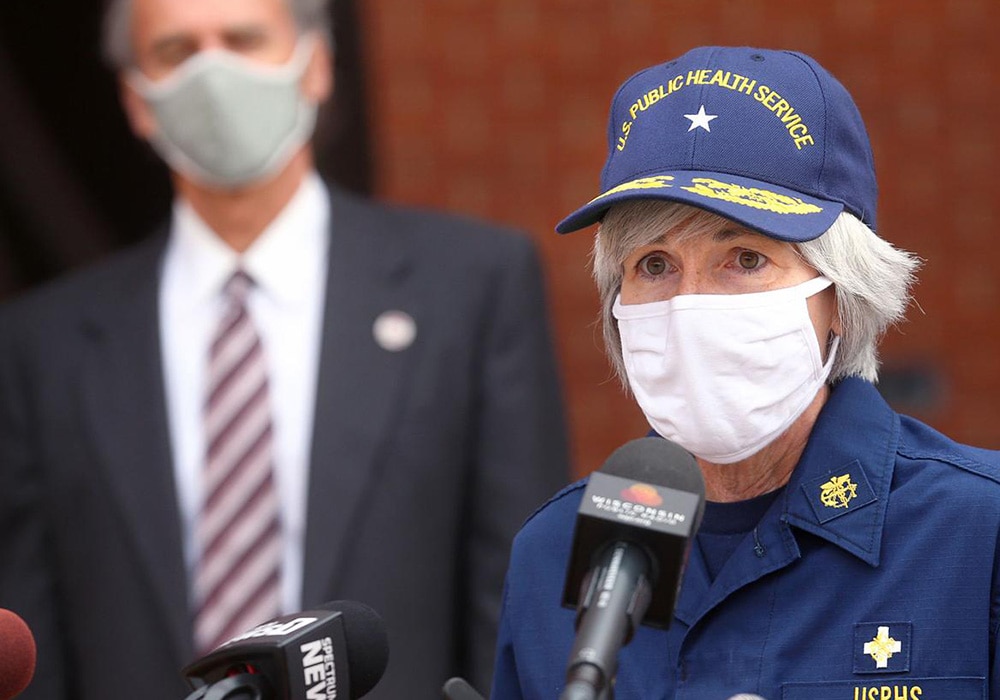Message from the Director
December 8, 2020

RADM Nancy Knight, MD speaks to the media with Chancellor Joe Gow of the University of Wisconsin-La Crosse after touring a COVID-19 surge testing site on campus.
Photo: Peter Thomson, La Crosse Tribune
Over the years, I’ve talked with senior leaders in the public and private sectors around the world about Disease X, the unknown pathogen that would require rigorous investigation and a significant global response. In January 2020, Disease X emerged in Wuhan, China, as COVID-19. Since then, we have seen the global benefits of our existing strengths in public health and identified the response capabilities we need to keep improving. Our partners in other countries tell me CDC’s global health security investments have built the foundation for their current fight against COVID-19 by tapping into global cooperation and support in areas like ending TB, controlling HIV and malaria, and eradicating polio. My staff in the Division of Global Health Protection (DGHP) have long worked with countries to develop the “CORE 4” components of their public health systems: workforce, surveillance, laboratory, and emergency management and response. By building these capacities, CDC’s partners are now better able to respond to COVID-19 as well as future public health emergencies.
Many of our Division’s flagship programs have also been integral to the COVID-19 emergency response. Since 2011, CDC has helped more than 25 countries develop national public health institutes (NPHIs). These CDC-like agencies consolidate national public health functions, bring data and expertise together, and coordinate response efforts to enable efficient outbreak detection and response. Many Public Health Institutes are leading countries’ and regions’ COVID-19 public health preparedness and response activities, including Africa CDC, the public health arm of the African Union. We’re also seeing our Field Epidemiology Training Program (FETP) graduates fill vital roles in country responses. A survey conducted in spring 2020 with 65 active FETPs showed that trainees in 85% of these programs are supporting COVID-19 responses. Moreover, FETP graduates from 100% of these programs are involved in COVID-19-related work such as data collection and analysis, contact tracing, and community education and outreach.
In addition, DGHP’s Global Rapid Response Team (GRRT) has been leveraged to assist with CDC’s domestic response to COVID-19. GRRT keeps a roster of 350-400 trained, expert CDC staff who can deploy anywhere in the world within 72 hours. With over 1,440 deployments and 45,000+ cumulative field support days in more than 85 countries since 2015, GRRT is the agency’s first line of defense for infectious disease outbreaks around the world. In January of this year, GRRT was quickly mobilized to deploy trained responders into CDC’s Emergency Operation Center (EOC) and out to U.S. states and territories to support increased domestic needs. This year, for COVID-19 alone, GRRT has provided more than 500 deployments for a total of nearly 16,000 person-days.
As of early December, our Division has been actively engaged in four concurrent emergency responses throughout 2020 – COVID-19, Ebola, polio, and measles. In CDC country offices, more than 90% of DGHP staff are working on COVID-19; more than half of those folks dedicate over 80% of their time to the response. Among headquarters staff, 93% have supported all four responses. While we are proud of these contributions and accomplishments, we recognize that there is still a lot of work to be done. We will continue to partner with countries around the world — to not only address COVID-19 — but also to strengthen our global health security approach as we move forward.
In this issue of Updates from the Field, you will read stories about the ways that our programs and activities have built and strengthened public health systems to respond to COVID-19. These stories highlight the continued need for CDC’s “CORE 4” investments to safeguard our ability to respond to public health crises into the future. The next Disease X is out there, and we will be better prepared to respond to it with continued support for global health security.
RADM Nancy Knight, MD
Director, Division of Global Health Protection
Center for Global Health
Video: Being Better Prepared for COVID-19 and the Next Global Health Emergency
(IEFA 2020 Toronto Global Forum Fireside Chat with Dr. Nancy Knight and Dan Barclay)